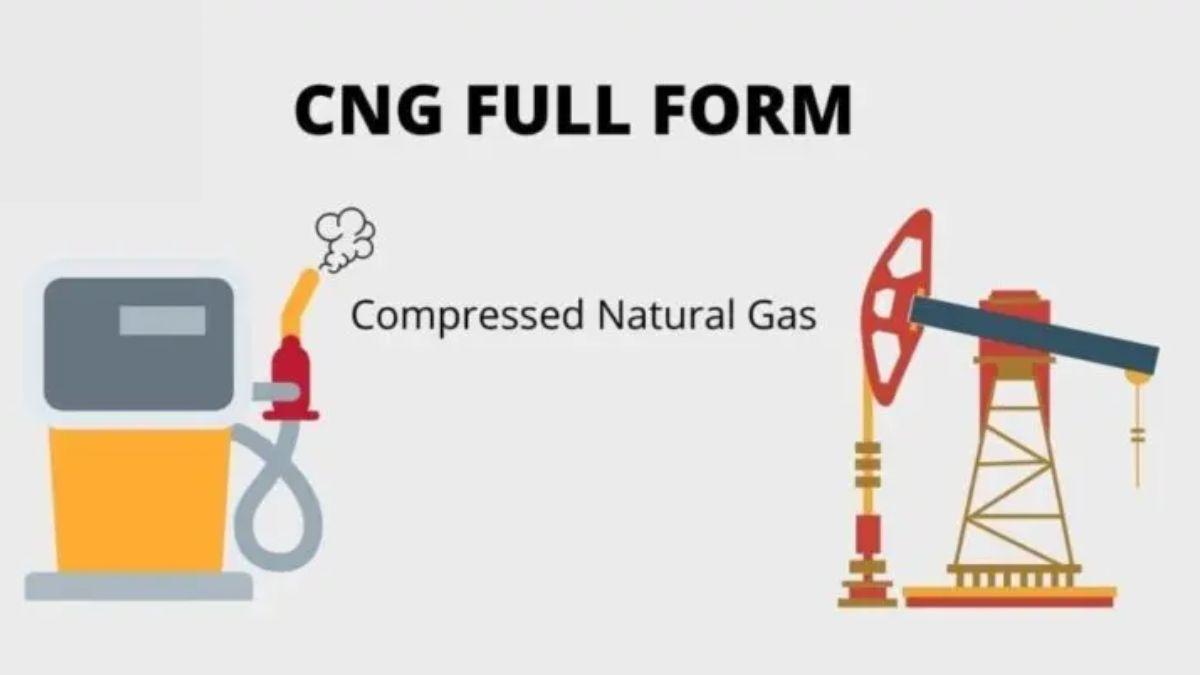Table of Contents
CNG is one of the most commonly used fuel in the world. The CNG are widely considered a better option than Diesel, Petrol and other conventional forms of fuel. But do you know what is the full form of CNG. You must have been listening about CNG from your childhood as a clean and green alternative to Petrol. In this article, we will learn about the CNG full form and other aspects of this highly important compound.
CNG Full Form
The CNG Full Form is Compressed Natural Gas. Compressed natural gas and liquified petroleum gas are the two types of natural gas used exclusively economically. CNG is a clear and odorless gas, with no corrosion and no toxic chemicals. The burning of CNG doesn’t cause any harm to nature because of its non-toxic properties. CNG doesn’t cause any pollution as the combustion of CNG doesn’t cause any black smoke.
CNG Full Form in English
The CNG stands for “Compressed Natural Gas” in English. Basically, in nature, CNG can be obtained from the surplus consistency of oil leftovers. It can be gathered from junkyards or sewage treatment facilities. Besides that, it is built in a way that makes it identifiable as biogas.
Additionally, the primary component of CNG gas is methane (CH4). Natural gas is scentless and consists of a mixture of gaseous hydrocarbons. It is specifically comprised of methane gas (CH4). Check some important points about CNG below.
- The main component of CNG is methane
- Decreases the production of carbon monoxide
- It’s completely a natural source that doesn’t harm any other natural property
- safer than diesel, in two ways less harm to the environment, and promotes no noise pollution. The vehicles that run on CNG produce less noise.
- it doesn’t contaminate the natural property like groundwater.
CNG Full Form: History
Check the history of the compressed natural gas herein.
- The utilization of natural gas as a fuel for cars was introduced in the late 1800s.
- The initial natural gas engine was produced in the US and soon after WWII, Italy and several other European countries adopted CNG as their main engine fuel.
- CNG is utilized in oil fields. It can also be sourced from wastewater treatment facilities and garbage dump areas.
- By compressing natural gas, the pressure is reduced to less than 1% of standard atmospheric pressure. It is maintained in resilient cylindrical and spherical tanks at a pressure range of 20-25 MPa.
CNG Meaning in Different Contexts
CNG can stand for several things depending on the context. Here are some common meanings:
- Compressed Natural Gas: This is the most common meaning of CNG. It refers to natural gas that has been compressed to a pressure of 200 to 250 bar (2900 to 3600 psi) to be used as a fuel source in vehicles and as an alternative to gasoline or diesel.
- Central Nervous System: In a medical context, CNG can stand for the central nervous system, which includes the brain and spinal cord.
- Certified Natural Gas: This term is sometimes used in the context of natural gas production and distribution to refer to gas that meets certain quality or safety standards.
- Conjunctive Normal Form: In the field of logic and computer science, CNG can refer to Conjunctive Normal Form, which is a way of representing logical formulas in a specific format.
- C.N. Grace & Co.: In a business context, CNG could refer to a company or organization with the initials C.N. Grace & Co.
Is CNG Cheaper than Diesel?
Yes, CNG is a natural gas that can be stored and transferred easily without causing any harm. Unlike other fuels like gasoline and diesel, it doesn’t even contain any harmful chemicals. CNG is made from greenhouse gases so compared to other fuels it is cheaper.
CNG Full Form in Science
CNG is made from greenhouse gases making it a natural and clean alternative for fuel. Methane is the main component of CNG. Approximately 93.05% of methane is used in the composting of CNG, with 6.95% consisting of other natural gases like nitrogen, propane, ethane and some amount of carbon dioxide.
CNG Full Form in Medical
In medical science, the full form of the CNG is different than the one you heard in general knowledge. The CNG full form in medical is: Chronic Non-atrophic Gastritis
What is the Calorific value of CNG?
The calorific value means the heat produced by the fuel when applied to constant pressure and the combustion of the fuel. The calorific value of CNG is around 35000 KJ/kg – 40000 KJ/kg.
CNG Advantages
The CNG has multiple advantages. Check some of the useful advantages of CNG below.
– less harm to the nature and atmosphere as it doesn’t produce any harmful gas.
– It is an alternative fuel that is cheaper than other fuels like diesel and gasoline.
– Reduces the production of Carbon monoxide which affects the ozone layer with global warming.
Related Article:



 CGPA Full Form, Meaning in Hindi, Kannad...
CGPA Full Form, Meaning in Hindi, Kannad...
 FIR Full Form, Check What is the Full Fo...
FIR Full Form, Check What is the Full Fo...
 TGT Full Form, Check What is the Full Fo...
TGT Full Form, Check What is the Full Fo...










